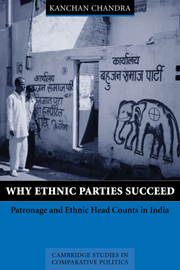Book contents
- Frontmatter
- Dedication
- Contents
- List of Maps, Figures, and Tables
- List of Abbreviations
- A Note on Terminology
- Acknowledgments
- 1 Introduction
- Part I Theory
- Part II Data
- Appendix A Elite Interviews
- Appendix B Ethnographies of Election Campaigns
- Appendix C Content Analysis
- Appendix D Description of Survey Data
- Appendix E Description of the Ecological Inference (EI) Method
- Appendix F Method Used to Estimate Ethnic Voting Patterns
- Bibliography
- Index
- Miscellaneous Endmatter
Appendix A - Elite Interviews
Published online by Cambridge University Press: 19 October 2017
- Frontmatter
- Dedication
- Contents
- List of Maps, Figures, and Tables
- List of Abbreviations
- A Note on Terminology
- Acknowledgments
- 1 Introduction
- Part I Theory
- Part II Data
- Appendix A Elite Interviews
- Appendix B Ethnographies of Election Campaigns
- Appendix C Content Analysis
- Appendix D Description of Survey Data
- Appendix E Description of the Ecological Inference (EI) Method
- Appendix F Method Used to Estimate Ethnic Voting Patterns
- Bibliography
- Index
- Miscellaneous Endmatter
Summary
Elite interviews are critical sources for any study of the BSP, especially for its early history. The party did not attract systematic newspaper coverage until 1993, when it came to power in Uttar Pradesh. The party's own publications are valuable sources of party history. However, I was unable to obtain access to the official archives of the party and so rely mainly on collections from private records and on the more extensive public record from 1993 onward. Elite interviews are, therefore, the most important sources on which I draw.
The data on elite motivations in this book come from 281 interviews with members of the BSP and its competition across Indian states. When citing an interview, I withhold the name and position of the respondent except when he or she is a prominent public figure and/or when the name or position is critical to the interpretation of the data obtained in the interview. All respondent names in the text are pseudonyms. Table A.1 describes the organizations whose members I interviewed and the states where the interviews were conducted.
I address in this appendix some variables that are relevant to assessing the quality of the data obtained from these interviews.
The majority of these interviews were conducted in party offices or in the homes of politicians. There were typically other people present or within calling distance, including family members, political associates, and favour seekers. During or before each interview, I introduced myself as a doctoral student based in the United States. I took detailed notes during and after each interview. The use of a tape recorder, however, made many respondents uncomfortable, and I typically did not even propose taping the interview except when interviewing MPs, MLAs, or other party functionaries who were used to having their statements recorded.
Among the many variables that might influence the quality of information that I obtained, perhaps the most relevant is my own repertoire of ethnic identities. And among these, caste was the most salient in my interviews with BSP elites. I ama nominal member of the “Bania” caste category, normally counted among the three Hindu upper castes. Most BSP elites asked openly about my caste identity (as I did about theirs) early in our conversation, and I responded by listing the relevant caste and subcaste labels that applied to my family.
- Type
- Chapter
- Information
- Why Ethnic Parties SucceedPatronage and Ethnic Head Counts in India, pp. 293 - 296Publisher: Cambridge University PressPrint publication year: 2004



